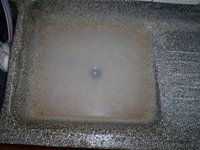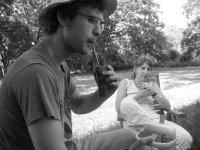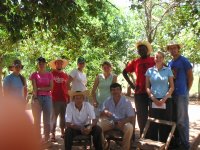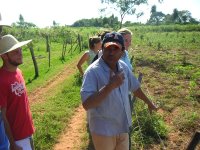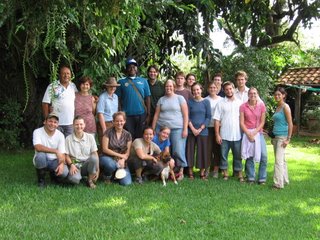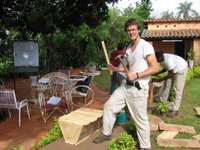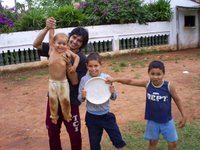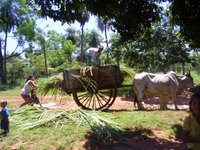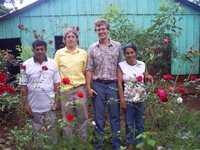Boo-Yah Ka-sha
 In my last entry, I reflected on the dangerous aspects of the Mango tree. You may have thought I was exaggerating the precautions necessary to live a life free of fruit induced concussions; that I was merely inflating the risks of my environment to make me seem like more of an adverturer once I had survived my time abroad.
In my last entry, I reflected on the dangerous aspects of the Mango tree. You may have thought I was exaggerating the precautions necessary to live a life free of fruit induced concussions; that I was merely inflating the risks of my environment to make me seem like more of an adverturer once I had survived my time abroad.But then this past week, while speaking with neighbors in my community, we all heard the familiar whisk of leaves and braced ourselves for the oncoming assault, and what happened? A Mango hit me square in the back! Ha! If you have the Terrere spilled on you while here, it's meant to be lucky, so I figure a Mango to the back has to be worth something.
The week started as normal and included a language class about how to identify different body parts in Guarani, as well as helpful health phrases for those unhealthy days which will surely come (unfortunately, the expression "I'm sorry I can't shake your hand because my fingers are swollen to the size of Chorizo Sausages from my 37 bee stings" was not included).
After a while the names of some body parts blended into the names of others, and b
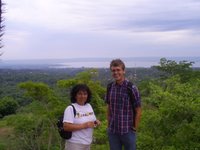 efore we knew it, we were learning all sorts of Paraguayan slang that would surely cause trouble (or at least a stifled chuckle) in an inappropriate context. It basically was a class on how to pick a fight in Guarani. Our teachers here have been great at letting us take the class where we need it to go.
efore we knew it, we were learning all sorts of Paraguayan slang that would surely cause trouble (or at least a stifled chuckle) in an inappropriate context. It basically was a class on how to pick a fight in Guarani. Our teachers here have been great at letting us take the class where we need it to go.As it turns out, Paraguayans do in fact have a Thanksgiving. However, here they just call it Jueves (that's not my joke). My Dia de Gracias was spent in the company of all of the other Trainees and their Dishes-to-pass. We feasted, shot slingshots at mangos, watched Ali G , fell into food comas, and discovered the local dark beer. A Thanksgiving well spent.
But then Friday came. Our "Dia-D" as my Language teacher called it. The day to learn where we'd all be living for the next two years. To help us relax a little (and I know I needed it) we all traveled in groups to different cultural sites in the surrounding areas. My group went to a national park, a church, an Artisan's training center and market, and finally (my favorite) a Museum of Parguayan Mythology.
This museum consisted of over a dozen life-size representations of the many myths prevalent in Paraguay. One such creature is the Pombero, who according to legend, is an animal that transforms into a alcohol-drinking, cigarette-smoking beast who will attack and kill you at night if you wal
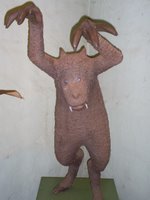 k alone. Its Boogey-man nature is quickly scoffed at by us trainees and turned into a playful joke amongst one another, but the Paraguayan people don't take it so lightly.
k alone. Its Boogey-man nature is quickly scoffed at by us trainees and turned into a playful joke amongst one another, but the Paraguayan people don't take it so lightly.One fellow trainee, Sam, was spending time with his host brother one night when he (Sam) began whistling. According to the code of the Pombero, he is attracted to this whistle and will come hunting in its direction. The host brother began to cry, so Sam asked for support from his host parents to help neutralze the situation and calm his brother down. "No" the mother said. "The Pombero is real. I saw him last night." This drove the child even further into hysterics and the situation was never resolved.
We eventually returned to Guarambare and were circled up to be given our site placements. One by one, our names were read off and we were instructed to place a sticky note on the larger map as to where we would be placed. I was the last to be called, and according to my Placement Director, "It's because he's going the furthest away!"
My site is in the small town of San Miguel, near Mayor Otano (where I visited the V olunteer Dan), in the Department of Itapua. I am very near the Argentinian border and a 12-hour bus ride from Asuncion (the capital of Paraguay). I will be a first volunteer in my community (although Dan has worked a little bit of bees there before). This upcoming week I will be travelling with my Community contact to visit San Miguel to scope out my new site.
olunteer Dan), in the Department of Itapua. I am very near the Argentinian border and a 12-hour bus ride from Asuncion (the capital of Paraguay). I will be a first volunteer in my community (although Dan has worked a little bit of bees there before). This upcoming week I will be travelling with my Community contact to visit San Miguel to scope out my new site.
I lucked out in a lot of ways to have landed this site (the Mango must have helped afterall) and from what I know, it seems like a good fit.
As Winston Churchill once said, "Had I had more time, I would have written you a shorter letter." Sorry this rambled on so long. I hope you got this far. Write me a message. They're nice to read.
Pictures
1) That very map I had mentioned with the sticky notes. I am the yellow one down in the South-Eastern region.
2) My Language teacher Delfina and I at the National Park.
3) One of the many Mythical creatures of Paraguay. This one, I thought, was the funniest.
4) A view of the lake in the nearby city of Aregua.

